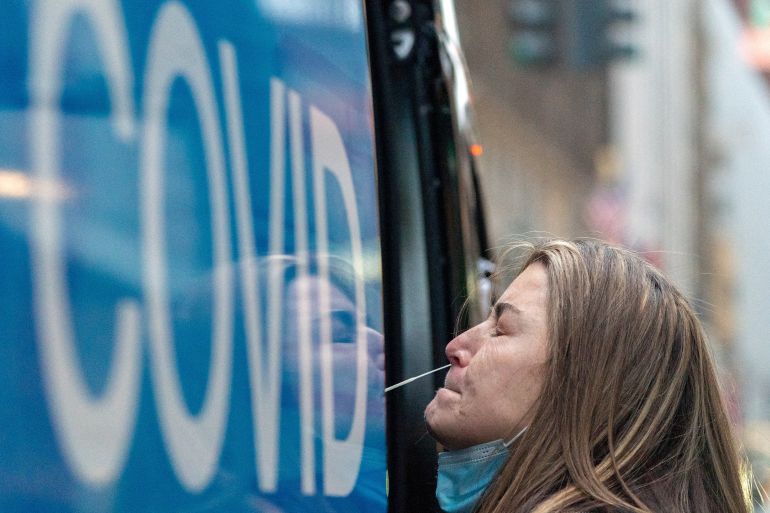Biden confirms end of Omicron travel curbs for African nations
US president says restrictions are ‘no longer necessary’, as new COVID-19 variant becomes dominant strain.

US President Joe Biden has formally ordered an end to travel restrictions on eight southern African countries imposed last month to slow the spread of the Omicron coronavirus variant, saying that the curbs are “no longer necessary to protect the public health”.
Biden issued a proclamation on Tuesday repealing the restrictions on travel into the United States from South Africa, Botswana, Zimbabwe, Namibia, Lesotho, Eswatini, Mozambique and Malawi.
Keep reading
list of 3 itemsAsymptomatic COVID patients in US can isolate for only five days
France to roll out new COVID-19 restrictions as Omicron surges
The ban will be lifted at 12:01am (05:01 GMT) on Friday.
The Biden administration had announced its intention to undo the travel restrictions late last week, as health officials announced Omicron already had become the dominant strain of the virus in the country.
“Importantly, scientific experts have determined that people who are vaccinated against COVID-19 are protected against severe disease and hospitalization from the Omicron variant,” Biden said in Tuesday’s decree.
“Moreover, the Omicron variant has now spread to more than 100 countries, and it is prevalent in the United States.”
The US and numerous countries around the world imposed travel bans on southern African nations late in November after the Omicron variant was first detected in South Africa.
The World Health Organization (WHO) designated the Omicron strain a “variant of concern” on November 26.
The WHO said earlier this month that there is “consistent evidence” that Omicron is spreading “significantly faster” than the previously dominant Delta variant. “And it is more likely people vaccinated or recovered from COVID-19 could be infected or re-infected,” WHO Director-General Tedros Adhanom Ghebreyesus said.
But researchers in South Africa and the UK have said their studies suggested that the new variant may lead to less severe illness and a lower risk of hospitalisation than the Delta strain.
The WHO had warned against travel restrictions after the Omicron variant was identified, saying that such measures pose challenges to global cooperation against the virus.
In early December, Tedros advised against “blanket travel bans”, which he said “place a heavy burden on lives and livelihoods”.
In the US, the Omicron variant has spread quickly despite the travel restrictions.
On Tuesday, new data from the US Centers for Disease Control and Prevention (CDC) estimated that Omicron accounted for 58.6 percent of new COVID-19 infections over the past week.
Infections have been on the rise across the US, with states including New York and Maine registering record numbers of new infections in the last seven days.
On Monday, the CDC shortened its quarantine recommendations for asymptomatic patients who test positive from COVID-19 from 10 to five days.
“These updates ensure people can safely continue their daily lives,” CDC Director Rochelle Walensky said in a statement. “Prevention is our best option: get vaccinated, get boosted, wear a mask in public indoor settings in areas of substantial and high community transmission, and take a test before you gather.”